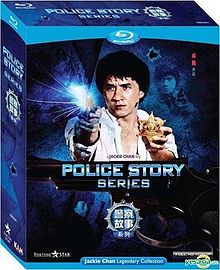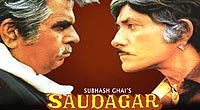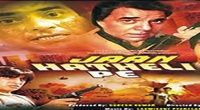The Police Story film series (Chinese: ??????) comprises six Hong Kong crime-action films, starring Jackie Chan, directed by Jackie Chan, Stanley Tong, Benny Chan, and Ding Sheng, and produced by Raymond Chow, Leonard Ho, Jackie Chan, Barbie Tung, Willie Chan, Solon So and Yang Du. The first film Police Story was released on 14 December 1985. After the film's success, five sequels and a spin-off were made.
| Police Story ?????? | |
|---|---|
Hong Kong Blu-ray box set for the first three Police Story films | |
| Traditional | ?????? |
| Simplified | ?????? |
| Mandarin | J?ngchá Gùshì Xì Liè |
| Cantonese | Ging2 Caat3 Gu3 Si6 Hai6 Lit6 |
| Directed by | Jackie Chan (I, II) Stanley Tong (III, IV, Once a Cop) Benny Chan (V) Ding Sheng (VI) |
| Produced by | Raymond Chow (I, II) Leonard Ho (I-III) Jackie Chan (III) Barbie Tung (IV, V, Once a Cop) Willie Chan (III, V) Solon So (V) Yang Du (VI) |
| Written by | Jackie Chan (I, II) Edward Tang (I-III) Ma Fibe Yee Lee-Wai (III) Stanley Tong (IV, Once a Cop) Elliot Tong Greg Mellott Nick Tramontane (IV) Alan Yuen (V) Ding Sheng (VI) Sandy Shaw (Once a Cop) |
| Starring | Jackie Chan Bill Tung Brigitte Lin Maggie Cheung Lam Kwok-Hung Chor Yuen Charlie Cho Mars Michelle Yeoh Yuen Wah Annie Wu Jackson Liu Nicholas Tse Charlie Yeung Charlene Choi Daniel Wu Yu Rongguang Jing Tian Liu Ye |
| Music by | Michael Lai Tang Siu-Lam (I, II) Mac Chew Jenny Chinn Jonathan Lee (III) Nathan Wang (IV) Tommy Wai (V) Zai Lao (VI) Richard Lo (Once a Cop) |
| Cinematography | Cheung Yiu-Cho (I, II) Danny Lee Yau Tong (II) Ardy Lam (III, Once a Cop) Jingle Ma (IV) Anthony Pun (V) Yu Ding (VI) |
| Edited by | Peter Cheung (I-IV, Once a Cop) Cheung Ka-Fai (III, Once a Cop) Yau Chi-Wai (IV, V) Ding Sheng (VI) |
| Distributed by | Hong Kong: Golden Harvest Media Asia Golden Way Films Co. Ltd. JCE Movies Limited Emperor Motion Pictures China Film Group Corporation United States: New Line Cinema Lions Gate Entertainment Dimension Films Well Go USA Entertainment |
Release date | 1985, 1988, 1992, 1993, 1996, 2004, 2013 |
Running time | 743 minutes (combined) |
| Country | Hong Kong |
| Language | Cantonese: (I, II, III, IV, V, Once a Cop) Mandarin: (III, IV, VI) English: (III, IV) |
| Box office | HK$254,795,969 (Hong Kong) US$45,725,283 (worldwide) |
Chan began work on the film after a disappointing experience working with another director on The Protector, which was intended to be his entry into the American film market. The first Police Story film is considered by fans to be one of Chan's best films. It was a massive hit in Asia. According to his autobiography, I Am Jackie Chan, Chan considers the film his best, in terms of action. The first three Police Story films were voted among the best action films of all time in Time Out's poll of film critics, directors, actors, and stunt actors, with Police Story ranked 4th, Police Story 2 ranked 61st, and Police Story 3 ranked 75th.
Screenplay
All of the Police Story films were produced by Raymond Chow, Leonard Ho, Jackie Chan, Barbie Tung, Willie Chan, Solon So and Yang Du, distributed by Golden Harvest, Media Asia, Golden Way Films Co. Ltd., and JCE Movies. They were all directed by Jackie Chan, Stanley Tong, Benny Chan and Ding Sheng.
Police Story (1985)
Police Story (Chinese: ????) was made in 1985. The Royal Hong Kong Police Force is planning a major undercover sting called "Operation Boar Hunt" to arrest crime lord Chu Tao (Chor Yuen). Inspector Chan Ka-Kui (or Kevin Chan in some versions) is part of the operation, along with undercover officers stationed in a shanty town. After arresting Chu, Chan's next assignment is to protect Chu Tao's secretary, Selina Fong (Brigitte Lin), who plans to testify in court about Chu Tao's illegal activities. The trial fails due to Selina's tampering with evidence. Though Chu Tao is released on bail, he wants revenge against Ka-Kui, framing him for the murder of fellow policeman Inspector Man. Meanwhile, Selina, realizing Chu's criminality, goes to his office at a shopping mall to download incriminating data from Chu Tao's computer system. Chu Tao and Chan notice this and head to the mall. In the ensuing fight, Ka-Kui defeats all of Chu Tao's henchmen while the police apprehend Chu and the briefcase.
Police Story 2 (1988)
Police Story 2 (Chinese: ??????), made in 1988, featured many of the same actors reprising their roles from the original. The story picks up with Chan Ka-Kui being demoted to a traffic cop for causing so much damage in his apprehension of Chu. Chu has been released from prison on the pretense that he is terminally ill, and Chu and his clan continue to harass Chan and his girlfriend May as Chan gets reinstated to the detective unit when criminal bombers begin extorting money from businessmen. The film marks the last appearance of Lam Kwok-Hung as Superintendent Raymond Li.
Police Story 3: Super Cop (1992)
Police Story 3 (Chinese: ????3???? or Supercop) was made in 1992. Michelle Yeoh joins the cast, portraying a police officer from mainland China. The story involves Chan and Yeoh's character going undercover to try to break up a drug smuggling ring. The action moves from China to Kuala Lumpur, where Chan's girlfriend May is kidnapped. The film marks the last appearance of Maggie Cheung as May. Michelle Yeoh reprises her role in the spin-off, called Once a Cop. Dimension Films released Police Story 3 in the US in 1996 under the name of Supercop with some edits to the film, the complete replacement of all music and sound effects, and English dubbing.
Police Story 4: First Strike (1996)
Police Story 4 (Chinese: ????4????? or Jackie Chan's First Strike) was made in 1996 and is the only film in the Police Story series made partially in English. Jackie reprises his role as Chan Ka-Kui (also known in some versions as Jackie) for the final time as the Hong Kong cop works with Interpol to track down and arrest an illegal weapons dealer. Later Ka-Kui realizes that things are not as simple as they appear and soon finds himself a pawn of an organization posing as Russian intelligence. The action shifts away from Hong Kong and Asia, with a globe trekking espionage plot, lending the film the air of a James Bond adventure. The New Line Cinema release in the US contained various alterations. Filmed on location in Ukraine and Australia, the film also marks the last appearance of Bill Tung, who plays Chan's superior "Uncle" Bill Wong in the series.
New Police Story (2004)
New Police Story (Chinese: ?????), made in 2004, is a reboot of the Police Story series. Chan portrays a disgraced detective named Chan Kwok-Wing, who accidentally leads his team into a trap from which he is the only survivor. Drowning his guilt in booze, he is eventually assigned a new younger partner who turns out to have his own secrets. However, they must work together if they are to stop the gang who killed Chan's team a year earlier. The film features younger Hong Kong actors such as Nicholas Tse, Charlene Choi, Charlie Yeung and Daniel Wu. The story features a more dramatic focus, taking a darker and more serious tone.
Police Story 2013 (2013)
Police Story 2013 (Chinese: ????2013 or Police Story: Lockdown), made in 2013, stars Jackie Chan in another reboot of the series. The film is directed by Ding Sheng, who previously helmed Chan's Little Big Soldier. Unlike the previous Police Story films where he portrayed a Hong Kong cop, Jackie portrays a mainland Chinese officer named Zhong Wen. Zhong heads to Wu Bar in search of his estranged daughter, Miao Miao (Jing Tian). He disapproves of Miao's relationship with Wu Jiang (Liu Ye), the nightclub owner. However, Wu, who is looking for the release of a long-time prisoner, takes Zhong, Miao, and a group of strangers hostage. The film was distributed as Police Story: Lockdown in the United States by Well Go USA Entertainment and released in June 2015.
Spinoffs
Once a Cop (1993)
Once a Cop (Chinese: ????), made in 1993, is a Hong Kong action film directed by Stanley Tong and starring Michelle Yeoh. It is a spin-off of Jackie Chan's Police Story film series involving the character Yeoh portrayed in Police Story 3: Supercop, Inspector Jessica Yang. The film is also known as Project S in original territories and many other titles, including Police Story IV (inaccurately), Police Story 3 Part 2, Supercop (UK) and Supercop 2 (US).
Both Jackie Chan and Bill Tung have cameo appearances as Inspector Chan Ka-Kui and "Uncle" Bill Wong in the film. Although Jackie Chan only has a cameo appearance, some DVD covers prominently featured Chan, misleading audience to think that he was one of the main characters. He reprises his role as Inspector Chan, but in drag to catch a criminal in drag wearing the same wig and clothes.
Police Story
Jackie Chan's first film featuring Chan as a Hong Kong cop was a blockbuster in Asia, Hong Kong, US and other foreign countries. Chan returned to fame after his first attempt to cross over to Hollywood ended in several box office bombs. The film grossed HK$26,626,760 (US$3,430,289) in Hong Kong and ¥1.04 billion (US$13.03 million) in Japan, totalling US$16.5 million in East Asia.
Police Story 2
Chan's second film in the series was an even bigger hit, grossing HK$34,151,609 in Hong Kong. And although the film was a huge success at the box office, it wasn't as appreciated as its predecessor at the Hong Kong Film Awards and only received one win.
Police Story 3: Super Cop
Police Story 3 is the first in the series not to be directed by Jackie, with Stanley Tong taking over the helm. It is also the last appearance in the series for Maggie Cheung as Ka-Kui's girlfriend, May. Police Story 3 grossed HK$32,609,783 in its Hong Kong theatrical run. After Chan's North American breakthrough in Rumble in the Bronx, Police Story 3 was released in North America on 25 July 1996 under the shorter title Supercop. Opening at 1,406 theatres, it grossed US$5,503,176 ($3,914 per screen), on its way to a total gross of US$16,270,600. The North American release by Dimension was well received.
James Berardinelli of website ReelViews wrote:
| “ | "As is usual in a Chan film, the end credits (which show out-takes of failed stunts) are one of Supercop's highlights. There are more laughs in this hilarious three-minute sequence than in the whole of Kingpin. I can't think of a better reason to stay through the entire movie. Ultimately, the closing montage points out one of the chief differences between Chan's stylized, fast-paced films and those of his American counterparts: this is action with a smile, not a grimace." | ” |
In the Washington Post, Richard Harrington said:
 Story of movie Police Story Film Series :
Story of movie Police Story Film Series : 









.jpg)
.jpg)




.jpg)




